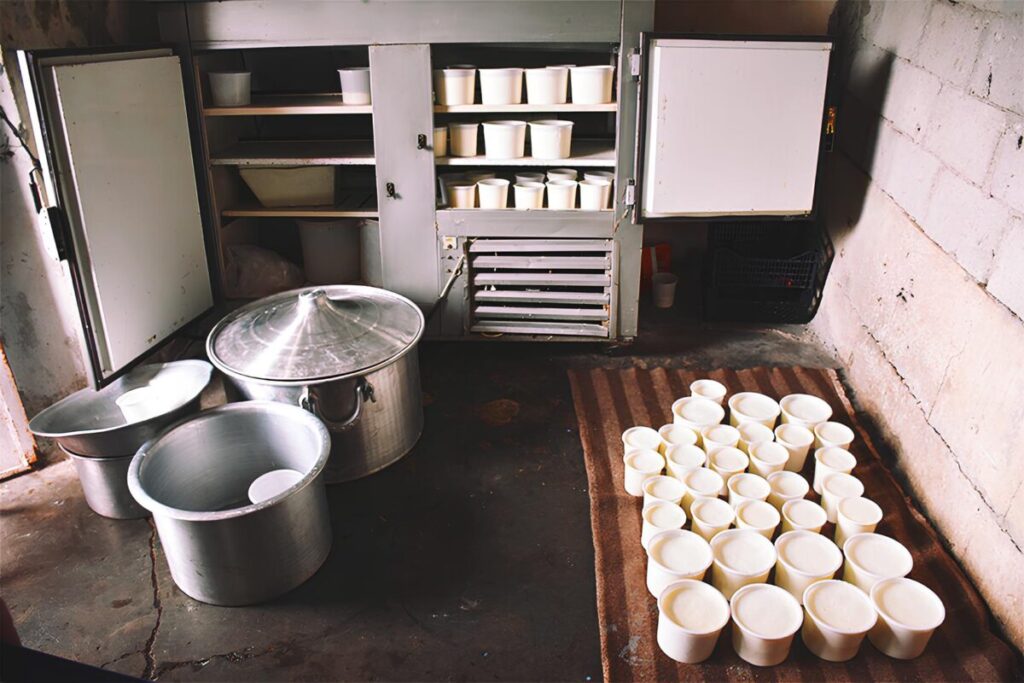Syria has always had to rely on imports to ensure its food supply. However, international sanctions and logistical difficulties caused by the war quickly undermined this system. Far from sinking, the country then saw a new generation of resourceful entrepreneurs emerge, who managed to turn challenges into opportunities and produce cheeses, vegetables, salamis, or biscuits that are more natural and local than before.
Many local initiatives have emerged, often in regions most affected by the armed conflict. In Damascus, Ahmad Al-Khatib, a dairyman by trade, transformed his business to produce mozzarella, Brie, and parmesan. "Many restaurants and hotels need this type of cheese, especially for their international menus. With the increasing demand, I immediately saw an opportunity to expand my cheese factory," explains the entrepreneur. From 150 white cheeses per month, the producer now produces over 310 cheeses of different varieties in his factory. Investing in suitable equipment was quite challenging, still due to importation issues and sanctions. "We had to make some machines ourselves with whatever means we had. With good will and internet resources, nothing was impossible," says Nidal, the engineer in charge of the machinery at the cheese factory. "The biggest challenge was undoubtedly finding foreign dairy cow breeds. For several months, I traveled across the country to find some animals. The breeds that were unavailable were brought from Turkey by land. Today, this livestock is doing very well and growing in number," Ahmad continues. Add to that the training of the teams, ensuring the successful production of quality products that rival imported ones.

From dependence to autonomy: an absolute necessity
In the city of Aleppo, Sami Al-Halabi converted his confectionery factory to produce biscuits and spreadable paste. Oreo, Kitkat, Nutella, all these big European brands have their counterparts in Syrian grocery stores. "It wasn't very difficult to do since we already had experience in the field. The challenge was to replace cocoa, impossible to produce locally and difficult to import," says the owner. By relying on traditional recipes and using local ingredients, he created products that quickly captivated customers. They managed to reduce their cocoa consumption by 60% by adding carob powder (Ceratonia siliqua) as well as oat bran, almonds, and hazelnuts.
In the Homs region, which has also been severely affected, innovation and resilience have taken precedence in meeting local food needs. Among the pioneers, Nour Al-Jundi, a local farmer, decided to focus on growing and processing tomatoes, a plant suited to the region's climatic conditions. "I took online courses to learn modern drying techniques, a crucial skill for producing high-quality sun-dried tomatoes. By using greenhouses and solar dehydrators, we have managed to maximize the efficiency of the drying process while preserving the nutrients and flavors of the tomatoes. And most importantly, the use of solar energy allows us to maintain competitive prices," the farmer explains.
Nour's sun-dried tomatoes are now a sought-after product in local markets, offering a healthy and flavorful alternative to imported products. This success has not only attracted the local market but has also delighted the Lebanese, for whom Nour has been exporting a portion of its production for the past two years.
Still in Homs, a small meat processing plant has been established. Specialized in the production of beef salami, it uses traditional Italian recipes and local spices that create a product with authentic flavors suited to the tastes of local consumers.
This initiative was led by a group of local entrepreneurs who identified an opportunity to enhance the bovine resources of the region. They invested in modern processing equipment, acquired before the tightening of economic sanctions. They also benefited from the expertise of master charcutiers trained abroad, who came to share their knowledge on-site. Thanks to these efforts, the factory now produces high-quality salami, contributing to food security and creating jobs in the region.
The keys to success
Several factors have enabled this industrial revival.
Training and skills transfer, first: many entrepreneurs have benefited from training to acquire new skills and improve their practices. These trainings are often organized by NGOs or international institutions.
Then access to technology: despite the sanctions, some entrepreneurs have managed to acquire modern equipment, notably thanks to networking or international funding. This will help improve quality and productivity.
The support from the authorities, as well: the Syrian government has implemented incentive policies to support the development of the agri-food industry. Subsidies, preferential loans, and customs facilitations have been granted to companies in the sector.
The resilience of the populations, finally: the Syrians have shown exceptional resilience in the face of adversity. Despite the difficulties, they have continued to work and produce to ensure their survival and that of their families.
Persistent challenges
While progress is noticeable, many challenges remain. Economic sanctions continue to weigh on the sector, limiting access to international markets and cutting-edge technologies. Infrastructure, damaged by war, slows down distribution and increases production costs. Additionally, the volatility of raw material prices and the shortage of skilled labor pose additional obstacles.
The future of the Syrian agri-food industry remains uncertain. The lifting of sanctions and the country's reconstruction will be essential to allow the sector to fully develop. However, Syrian entrepreneurs have already demonstrated their ability to adapt and innovate, even in the most challenging conditions. Through these successes, they prove that a crisis can be an opportunity to reinvent themselves and build a more sustainable future.

